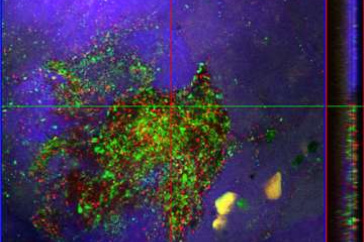UNH Researchers Selected for NASA Astrobiology Initiative

Study organisms growing in a biofilm community in Vaughn Cooper's lab, captured in a light that speaks to the idea that bacterial communities can help us think about astrobiology.
DURHAM, N.H. - How does life begin and evolve? It is, possibly, the most complex and mystifying scientific puzzle that researchers continue to explore. Scientists at the University of New Hampshire will delve deeper into that puzzle as part of a team of researchers who were tapped by NASA for research in astrobiology, a multidisciplinary field that studies the origin, evolution, distribution, and future of life in the universe.
"NASA has recognized that experimental evolution offers a promising approach to tackle these huge problems," says Vaughn Cooper, associate professor of microbiology and genetics and leader of the UNH team.
Cooper explains that for decades scientists have recognized that cooperative interactions are fundamental features of biological systems, but their origins are largely unknown. With that in mind, Cooper's team specifically will look at how microbes growing on surfaces, or in biofilms, can modify their environments and evolve synergistic interactions that reflect the origins of multicellularity. Using laboratory evolution experiments with microbial populations, scientists will study the genotypes (an organism's genetic code) and phenotypes (expressed traits of an organism) that arise in biofilms, and the interactions among phenotypes in simple communities.
"Because the principal actors in the first 2.5 billion years of life's drama were exclusively microbes, we will use these forms to unlock the secrets of life's transitions from simple units to self-organizing, self-replicating, energy-gathering systems that range in complexity from single cells to ecosystems," Cooper says.
"A distinctive feature of our approach is that we will study the dynamics of the evolutionary process looking into the future as well as in real time. Because these microbes can be cryogenically preserved, we can create a living fossil record for our genomic analyses," he says.
Cooper's laboratory joins an interdisciplinary team led by evolutionary geneticist Frank Rosenzweig of the University of Montana at Missoula and researchers from Stanford University, Penn State, and the University of Colorado Boulder. Cooper's lab will receive $1 million of the award, which totals $8.9 million. The grant is one of five five-year grants totaling $50 million awarded to seven research teams nationwide to study the origins, evolution, distribution, and future of life in the universe. The interdisciplinary teams will become members of the NASA Astrobiology Institute (NAI), headquartered at NASA's Ames Research Center, Moffett Field, Calif.
"With the Curiosity rover characterizing the potential habitability of Mars, the Kepler mission discovering new planets outside our solar system, and Mars 2020 on the horizon, these research teams will provide the critical interdisciplinary expertise to help interpret data from these missions and future astrobiology-focused missions," says Jim Green, director, Planetary Science Division, at NASA Headquarters, Washington.
Cooper's project is titled "Reliving the Past: Experimental Evolution of Major Transitions in the History of Life." The research that led to this project is supported by the NH Agricultural Experiment Station (NHAES) and a CAREER Award from the National Science Foundation.
The University of New Hampshire, founded in 1866, is a world-class public research university with the feel of a New England liberal arts college. A land, sea, and space-grant university, UNH is the state's flagship public institution, enrolling 12,300 undergraduate and 2,200 graduate students.
PHOTO
http://colsa.unh.edu/biofilmcommunity
Study organisms growing in a biofilm community in Vaughn Cooper's lab, captured in a light that speaks to the idea that bacterial communities can help us think about astrobiology.
Photo courtesy of Vaughn Cooper.
Vaughn Cooper can be reached for interviews at vaughn.cooper@unh.edu
Latest News
-
October 30, 2024
-
October 10, 2024
-
October 8, 2024
-
October 3, 2024
-
October 1, 2024
















































